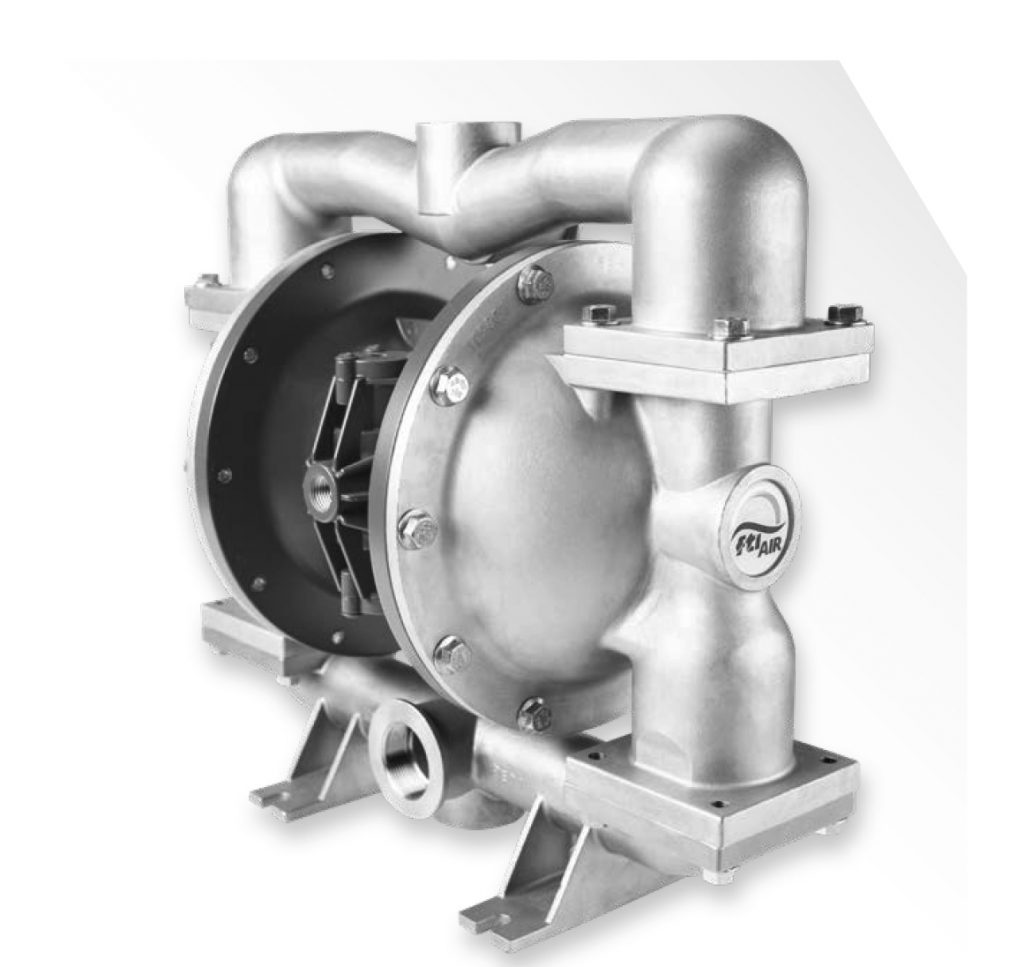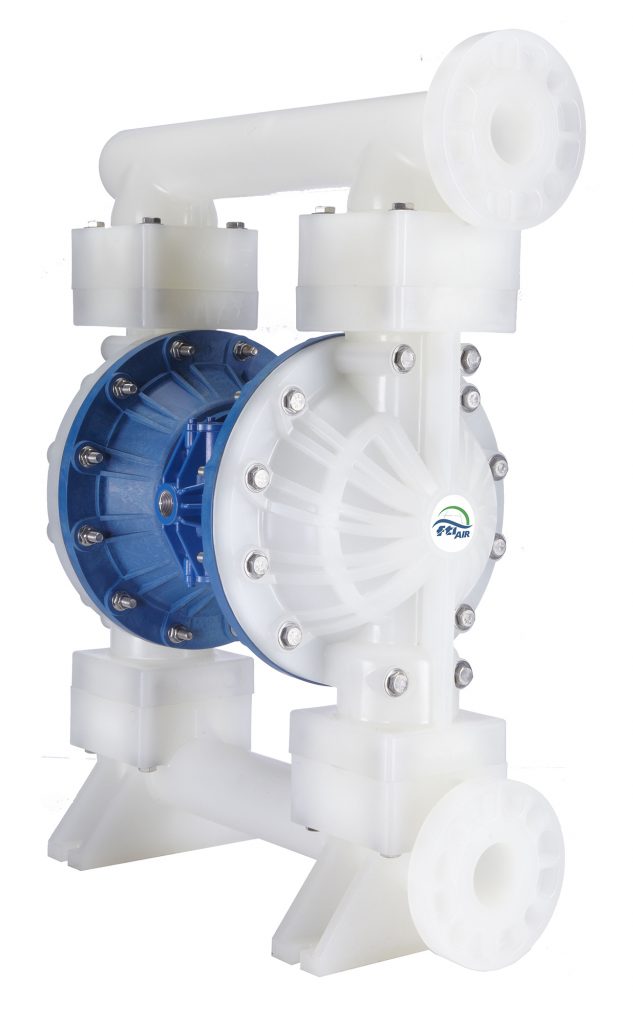Centrifugal Pumps in Sardis, GA

MSDB SERIES - MAGNETIC DRIVE, SEALLESS, Sardis CENTRIFUGAL PUMPS
- Horizontal or vertical (with IEC motor only) installation
- Minimum flow rate is 1 gpm (.23m3/h)
- Heads up to 300 feet (91.5m)
- High power neodymium magnetic drive system handles high specific gravity fluids
- Compact close-coupled design
- Two stage versions contain two impellers, three stage versions contain three impellers
- Engineered for corrosive fluids with polypropylene/Ryton© or PVDF/Ryton© construction
- Sealless design improves reliability with no seal maintenance to perform or seal leaks
- Maximum working pressure up to 135 PSI (9.3 bar)
- High specific gravity handling – over 1.8
Sardis, GA Drum Pump Accessories
- Cycle Counter - The FTI Air Cycle Counter is an electronic device that counts pump cycles by detecting the presence of the valve carrier. The cycle counter can be universally used on any new or existing FTI Air pump with the proper air valve components.
- Liquid Level Control - The FTI Liquid Level Control is a pneumatic/mechanical device that will automatically turn the pump on and off as the liquid level changes
- AODDampener - AODDampener is unique pulsation dampener manufactured from 316L stainless steel with PTFE backed diaphragm, has fully automatic air control and handles a wide variety of applications.
- Pulsation Dampeners - Removes virtually all hydraulic shock while producing a near steady flow of fluid. Protect piping, valves and fittings from destructive pulsations and surges. Available in a wide range of materials of construction
- Filter/Regulator - Compact, integrated design saves space and reduces piping, includes dual scale psi/Bar gage. Filters incoming air to five microns. Regulator adjusts air pressure from 7.3 to 120 psi (.5 to 8.3 bar).
- SPILLSTOP - Fully pneumatic system safely captures leaked product due to diaphragm failure and automatically shuts down failed pumps to eliminate costly product loss and prevent hazardous spills.


Practical Applications for Drum Pumps in Sardis, GA
- Manufacturing: Fluids like coolants, lubricants, and cleaning agents are transferred using drum pumps in manufacturing settings.
- Water treatment: In water treatment facilities and other locations where clean water is required, drum pumps are used to move water and other fluids.
- Drum pumps are used in power generation facilities, such as nuclear power plants and coal-fired power plants, to move fluids.
- Drum pumps are used in the mining sector to move fluids like chemicals and water.
- Construction: To transport construction materials like concrete and grout, drum pumps can be used.
- Gasoline production: The oil and gas industry uses drum pumps to transport fluids like oil.
- Chemical processing: Drum pumps are used to move chemicals in a range of chemical processing applications, such as the manufacture of personal care products, food processing, and pharmaceuticals.
- Agriculture: Drum pumps are used to deliver water and other fluids to plants and crops.
Choosing the Correct Drum Pump in Sardis GA
When selecting the ideal drum pump for a specific use, there are several factors that should be taken into account. These factors include:
- Compatibility with the medium being transferred: Different models of drum pumps are specifically designed to handle different types of liquids. It is crucial to select the pump that is compatible with the type of liquid you need transported, as some liquids or chemicals can be too abrasive or viscous to work with certain models.
- Volume and flow rate: Consider both the volume and flow rate of the liquid you need to move. Ensure that the drum pump you select has a flow rate that meets your requirements.
- Safety considerations: Pick a pump that complies with applicable safety regulations and is suitable for the unique dangers prevalent in your application. Make sure the pump is explosion-proof, for instance, if you are transporting explosive liquids.
- Power source: Choose a pump that will meet the demands of your application and the type of power source you have available.
- Size and weight: Take into account the size and weight of both the pump and the drum or other container from which you will be transferring the liquid. Verify that the pump can fit inside the drum and is not too heavy to handle.
- Price: Establish your spending limit and select a pump that satisfies your requirements at a cost you are comfortable paying.


Sardis GA Air-Operated Diaphragm Chemical Pumps are Durable, Reliable, and Easy to Maintain
These pumps can move a wide range of chemicals, both acidic and alkaline, reliably and with the least amount of maintenance. Because they are powered by air, they can be used in dangerous places because they can't explode and don't have any electrical parts. Air-Operated Diaphragm Chemical Pumps are long-lasting and reliable pieces of equipment that can be used for a long time in harsh conditions.
Not only do these pumps need little maintenance, but they also have a system of air valves that keeps the flow rate and pressure consistent. They work well to move a wide range of chemicals without the need for priming or lubrication. Air Operated Diaphragm Chemical Pumps are very easy to maintain, making them an ideal choice for many chemical applications.

Sardis, GA Air-Operated Diaphragm Chemical Pumps and Their Applications
An Air Operated Diaphragm Chemical Pump is a type of positive displacement pump that uses a combination of compressed air and an elastic diaphragm to move chemical liquids. This type of pump is often used in industrial settings, such as chemical processing plants and water treatment facilities, due to its ability to handle high flow rates and corrosive materials. It’s also known for its superior design, as it can run dry without causing damage, making it more reliable than other types of pumps.
These pumps are highly versatile and have a wide range of applications. They are often used in the chemical, pharmaceutical, and food industries, as well as in industrial, agricultural, and water treatment operations. Air Operated Diaphragm Chemical Pumps can be used to transfer, meter, or dispense low to high-viscosity fluids and chemicals while providing precise, accurate flow rates with minimal maintenance.
